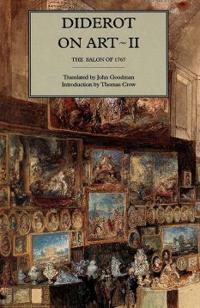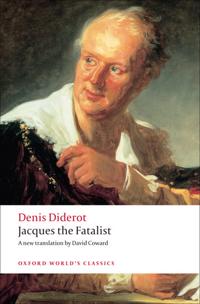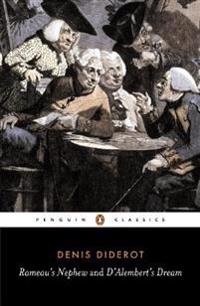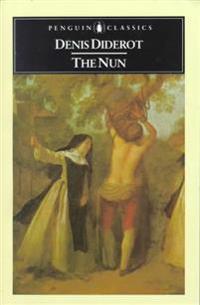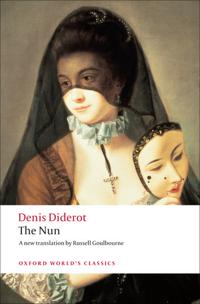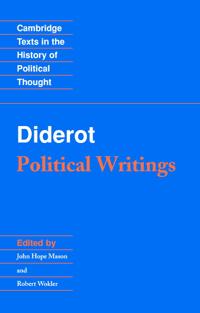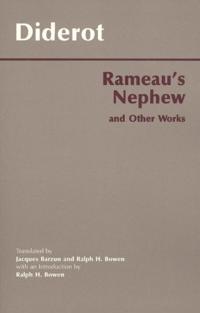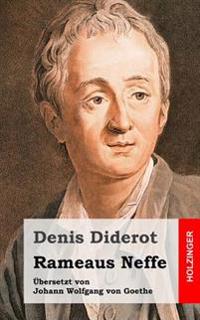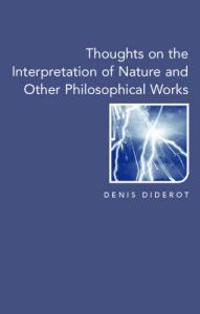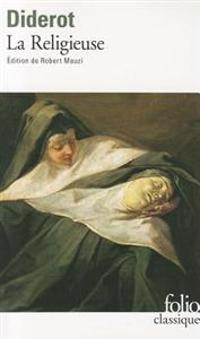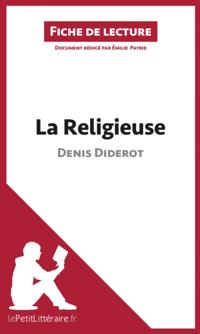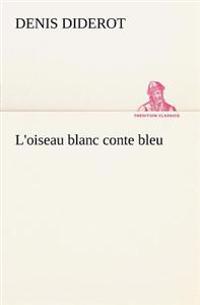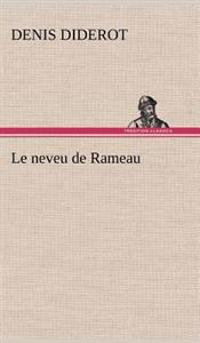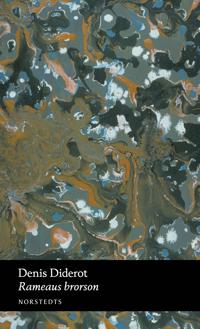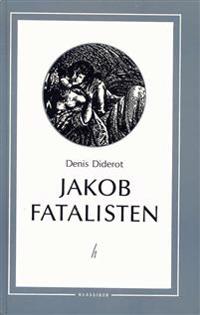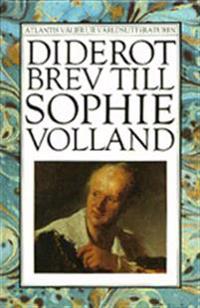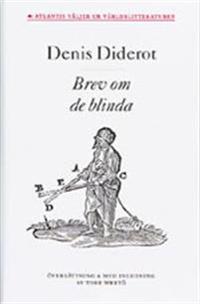Diderot on Art (Häftad)
avDenis Diderot
ISBN: 9780300062526 - UTGIVEN: 199509The 18th-century French philosopher Denis Diderot - the principal intelligence behind the "Encyclopedie" and the author of idiosyncratic fictional works such as "Jacques the Fatalist" and "Rameau's Nephew" - is also considered by many to have been the first great art critic. Until now, however, Dide[...]
Dorval; Or, the Test of Virtue. a Comedy. Translated from the French of Monsieur Diderot. (Häftad)
avDenis Diderot
ISBN: 9781170506035 - UTGIVEN: 2010-05Jacques the Fatalist and His Master (Pocket)
avDenis Diderot, David Coward, Denis Diderot
ISBN: 9780199537952 - UTGIVEN: 200908'Your Jacques is a tasteless mishmash of things that happen, some of them true, others made up, written without style and served up like a dog's breakfast.' Jacques the Fatalist is Diderot's answer to the problem of existence. If human beings are determined by their genes and their environment, how [...]
Rameau's Nephew / D'Alembert's Dream (Storpocket)
avDenis Diderot
ISBN: 9780140441734 - UTGIVEN: 1976-07One of the key figures of the French Enlightenment, Denis Diderot was a passionate critic of conventional morality, society and religion. Among his greatest and most well-known works, these two dialogues are dazzling examples of his radical scientific and philosophical beliefs. In Rameau's Nephew, t[...]
The Nun (Pocket)
avDenis Diderot
ISBN: 9780140443004 - UTGIVEN: 1977-11In 1758 Diderot's friend the Marquis de Croismare became interested in the cause celebre of a nun who was appealing to be allowed to leave a Paris convent. Less than a year later, in an affectionate attempt to trick his friend, Diderot created this masterpiece a fictitious set of desperate and plead[...]
The Nun (Häftad)
avDenis Diderot
ISBN: 9780199555246 - UTGIVEN: 200811Diderot's TheNun (La Religieuse) is the seemingly true story of a young girl forced by her parents to enter a convent and take holy orders. A novel mingling mysticism, madness, sadistic cruelty and nascent sexuality, it gives a scathing insight into the effects of forced vocations and the unnatural [...]
Political Writings (Pocket)
avDenis Diderot, John Hope Mason, Robert Wokler
ISBN: 9780521369114 - UTGIVEN: 1992-11Denis Diderot (1713-1784) was one of the most significant figures of the French enlightenment. His political writings cover the period from the first volume of the Encyclopedie (1751), of which he was principal editor, to the third edition of Raynal's Histoire des Deux Indes (1780), one of the most [...]
Revisiting the Jewish Question (Häftad)
avDenis Diderot, Elisabeth Roudinesco
ISBN: 9780745652191 - UTGIVEN: 2013-11-30What does it mean to be Jewish? What is an anti-Semite? Why does the enigmatic identity of the men who founded the first monotheistic religion arouse such passions? We need to return to the Jewish question.[...]
Revisiting the Jewish Question (Häftad)
avDenis Diderot, Elisabeth Roudinesco
ISBN: 9780745652207 - UTGIVEN: 2013-11-30What does it mean to be Jewish? What is an anti-Semite? Why does the enigmatic identity of the men who founded the first monotheistic religion arouse such passions? We need to return to the Jewish question.[...]
Rameau's Nephew and Other Works (Pocket)
avDenis Diderot, Jacques (TRN) Barzun, Ralph Henry (TRN) Bowen
ISBN: 9780872204867 - UTGIVEN: 2001-03This anthology features unabridged translations of Diderot's best work as a literary artist, including those writings that embody his most original and influential ideas. A reprint of the Library of Liberal Arts edition of 1964.[...]
Thoughts on the Interpretation of Nature and Other Philosophical Works (Pocket)
avDenis Diderot, David J. (EDT) Adams, David J. Adams
ISBN: 9781903083055 - UTGIVEN: 2000-03Analyse : Supplément au voyage de Bougainville de Denis Diderot (analyse complète de l'oeuvre et résumé) (häftad)
ISBN: 9782806212344 - UTGIVEN: 2014-04La Religieuse de Denis Diderot (Fiche de lecture)
ISBN: 9782806265500 - UTGIVEN: 2015-11Decryptez La Religieuse de Denis Diderot avec l'analyse du PetitLitteraire.fr !Que faut-il retenir de La Religieuse, un classique de la litterature francaise ? Retrouvez tout ce que vous devez savoir sur cette A uvre dans une fiche de lecture complete et detaillee.Vous trouverez notamment dans cette[...]
Denis Diderot - Ein funkensprühender Kopf (Häftad)
avWerner Raupp
ISBN: 9783828831643 - UTGIVEN: 2013-07Rameaus brorson (Häftad)
avDenis Diderot
ISBN: 9789113070391 - UTGIVEN: 2015-04»Antingen det är fult eller vackert väder så har jag för vana att promenera i Palais-Royal vid femtiden på eftermiddagen.« Rameaus brorson (1762) är en roman i dialogform mellan berättaren och Rameaus brorson, som inte uträttat något och heller inte har velat uträtta något. Han är en [...]
Jakob fatalisten och hans husbonde : landsvägsliv, kärlekshandel och krogan (Inbunden)
avDenis Diderot
ISBN: 9789171230010 - UTGIVEN: 199202Den här boken inleder vår nutid. Goethe tyckte om boken. Hegel fascinerades av hans fria berättande och för Marx var han favoritförfattare.
Det är för sin tid en mycket vågad erotisk berättelse. historien om tjänaren och husbonden som underhåller varandra med sina kärlekshisto[...]Brev till Sophie Volland (Inbunden)
avDenis Diderot
ISBN: 9789174864496 - UTGIVEN: 198801Diderot och Sophie Volland träffades 1756. Han var då gift och fyrabarnsfar. Sophie, av god familj, bodde tillsammans med med sin mor och syster, och Diderot kom ofta på besök i huset. Men han kom också dit i henmlighet via "den lilla trappan" till Sophies rum. När modern efter några år uppt[...]
Brev om de blinda till gagn för dem som ser (Inbunden)
avDenis Diderot
ISBN: 9789174866261 - UTGIVEN: 200209Brev om de blinda som publicerades 1749 och som resulterade i att Diderot fängslades och satt inspärrad på slottet Vincennes under fyra månader, är inte en skrift som primärt ägnas blindhet. Diderot söker istället svar på sådana allmängiltiga frågor som inbegrips i termerna filosofi och[...]

